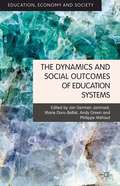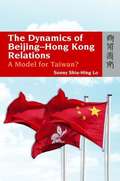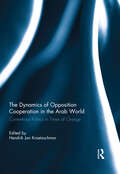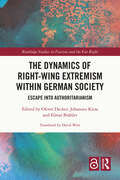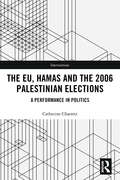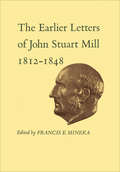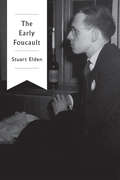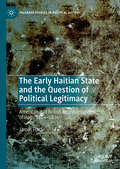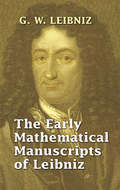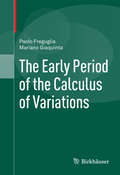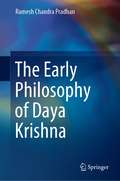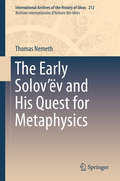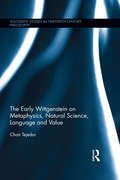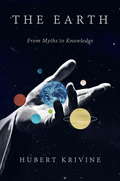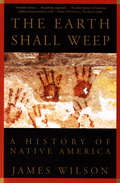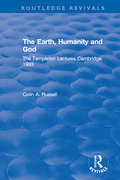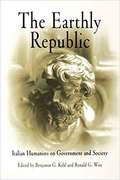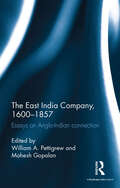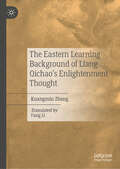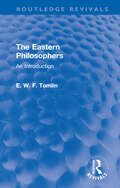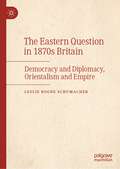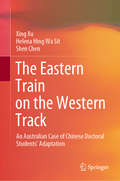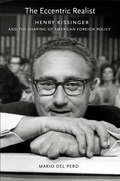- Table View
- List View
The Dynamics and Social Outcomes of Education Systems
by Andy Green Jan Germen Janmaat Marie Duru-Bellat Philippe M�hautThis collection critically examines the dynamics and social outcomes of systems of lifelong learning.
The Dynamics of Beijing-Hong Kong Relations: A Model for Taiwan?
by Sonny Shiu-Hing LoThis book critically assesses the implementation of the one country, two systems in the Hong Kong Special Administrative Region (HKSAR) from the political, judicial, legal, economic and societal dimensions. the author contends that there has bee
The Dynamics of Opposition Cooperation in the Arab World: Contentious Politics In Times Of Change
by Hendrik Jan KraetzschmarWithin the democratisation literature, opposition unity is widely seen as an important requisite to successfully pressure authoritarian rulers into liberalising reforms and in bringing about democratic change. Taking up on this theme, this book examines the myriad ways in which opposition groups across the Arab world have sought to coalesce into broader reform coalitions at the local, national and transnational levels to challenge authoritarian incumbents and their policies. Drawing on original case studies from the region, it sheds light on the diverse nature and objectives of these reform coalitions, and explores the challenges opposition groups face in Arab states in uniting behind a common reform agenda and in driving this agenda forward. Be they electoral pacts, local government coalitions, broader opposition alliances or networks of resistance, this book demonstrates that, although widespread, the record of collective opposition activism in the Arab world is mixed, with many reform coalitions lacking the necessary cohesion and mass appeal to effectively mobilise for change. This book was originally published as a special issue of British Journal of Middle Eastern Studies
The Dynamics of Right-Wing Extremism within German Society: Escape into Authoritarianism (Routledge Studies in Fascism and the Far Right)
by Oliver DeckerThe Dynamics of Right-Wing Extremism within German Society explores the prevalence of right-wing extremist attitudes in Germany. The book provides a thorough psychosocial and sociological theory of general authoritarian dynamics to explain broader societal attitudes, particularly focusing on right-wing extremism. It provides a uniquely long-term perspective on the different dimensions of right-wing extremism—the affinity for dictatorial forms of government, chauvinist attitudes, the trivialisation or justification of National Socialism, anti-Semitism, xenophobia, and social Darwinism. The first chapter delineates the theoretical framework of authoritarian dynamics, while subsequent chapters provide an in-depth analysis of empirical findings and distinguish authoritarian and democratic typologies. The authors focus on recognition of authoritarian statehood and anti-Semitism; the relationship between religion and right-wing extremism; and support for the radical-right populist party, Alternative für Deutschland (AfD). The innovative theoretical approach of this book scrutinizes the theory of authoritarianism in the contemporary world. This book provides unique empirical data and will be of interest to scholars of German politics, anti-democratic attitudes and prejudices, sociology, political science, and social psychology. The Open Access version of this book, available at www.taylorfrancis.com, has been made available under a Creative Commons Attribution-Non Commercial-No Derivatives 4.0 license.
The EU, Hamas and the 2006 Palestinian Elections: A Performance in Politics (Interventions)
by Catherine CharrettThis book addresses how institutional and diplomatic rituals shaped the European Union’s sanction of Hamas after the latter’s success in the 2006 Palestinian legislative elections. Through a lens of performance and performativity it explains how socialisation and the duress of performative rituals shapes agency and prevents the possibility of being creative with policy initiatives when confronted with difficult decisions. Interviews with senior Hamas representatives, EU bureaucrats, members of the European External Action Service, and electoral observers from Palestine and Europe, in addition to ethnographic research in Gaza and in Brussels, recreate the details of the failed diplomacy between Hamas and the EU. The book explores the social and visual cultures and discourses that shape the recognition of contemporary subjects, and it presents Hamas’s response to being treated as a terrorist movement. It advances queer and postcolonial understandings of European-Palestinian political encounter by interrogating the bureaucratic and professional pressures that shape the political agency of EU civil servants and the recognition of Palestinian politics. This is a performative and interdisciplinary text; it juxtaposes empirical investigation, with critical theory, performance art and everyday experiences. It will appeal to students of International Relations, Interdisciplinary Studies, Middle-East Area Studies, Foreign Policy and Diplomacy Analysis and Gender Studies.
The Earlier Letters of John Stuart Mill 1812-1848: Volumes XII-XIII
by John Stuart Mill Francis MinekaThese volumes of Mill's letters have been awaited eagerly by all scholars in the field of nineteenth-century studies. They inaugurate most auspiciously the edition of the Collected Works of John Stuart Mill planned and directed by an editorial committee appointed from the Faculty of Arts and Science of the University of Toronto and from the University of Toronto Press. In this collection of 537 letters and excerpts of letters are included all the personal letters available. It contains 238 hitherto unpublished letters and 72 letters with previously unpublished passages. Letters previously published have been recollated whenever possible. All are meticulously edited and annotated.
The Early Foucault
by Stuart EldenIt was not until 1961 that Foucault published his first major book, History of Madness. He had already been working as an academic for a decade, teaching in Lille and Paris, writing, organizing cultural programmes and lecturing in Uppsala, Warsaw and Hamburg. Although he published little in this period, Foucault wrote much more, some of which has been preserved and only recently become available to researchers. Drawing on archives in France, Germany, Switzerland, Sweden and the USA, this is the most detailed study yet of Foucault’s early career. It recounts his debt to teachers including Louis Althusser, Jean Hyppolite, Maurice Merleau-Ponty and Jean Wahl; his diploma thesis on Hegel; and his early teaching career. It explores his initial encounters with Georges Canguilhem, Jacques Lacan, and Georges Dumézil, and analyses his sustained reading of Friedrich Nietzsche, Edmund Husserl and Martin Heidegger. Also included are detailed discussions of his translations of Ludwig Binswanger, Victor von Weizsäcker, and Immanuel Kant; his clinical work with Georges and Jacqueline Verdeaux; and his cultural work outside of France. Investigating how Foucault came to write History of Madness, Stuart Elden shows this great thinker’s deep engagement with phenomenology, anthropology and psychology. An outstanding, meticulous work of intellectual history, The Early Foucault sheds new light on the formation of a major twentieth-century figure.
The Early Haitian State and the Question of Political Legitimacy: American and British Representations of Haiti, 1804—1824 (Palgrave Studies in Political History)
by James FordeThis book explores the different ways in which the early Haitian state was represented in print culture in America and Britain in the early nineteenth century. This study demonstrates that American and British arguments about the most effective forms of governance and political leadership impacted how Haiti’s early leaders were presented to transatlantic audiences. From the end of the Haitian Revolution and the moment that Haitian independence was declared in 1804, conservatives and radical thinkers on both sides of the Atlantic used Haiti and its early leaders as central frames of references in discussions of political legitimacy. Against the backdrop of a vibrant and volatile age of revolutions, the different forms of governance adopted by Jean Jacques Dessalines, Henry Christophe and Jean Pierre Boyer were used by writers, playwrights and caricaturists to either support or call into question the legitimacy of America’s and Britain’s own forms of government.
The Early Mathematical Manuscripts of Leibniz
by G. W. Leibniz J. M. ChildThe manuscripts and correspondence of Leibniz possess a special interest: they are invaluable as aids to the study of their author's part in the invention and development of the infinitesimal calculus. In addition, the main ideas behind Leibniz's philosophical theories lay here, in his mathematical work.This volume consists of two sections. The first part features Leibniz's own accounts of his work, and the second section comprises critical and historical notes and essays. An informative Introduction leads to the "postscript" to Leibniz's 1703 letter to James Bernoulli, his "Historia et Origio Calculi Differentialis," and manuscripts of the period 1673-77. Essays by the distinguished scholar C. I. Gerhardt follow--Leibniz in London and Leibniz and Pascal, along with additional letters and manuscripts by Leibniz.
The Early Period of the Calculus of Variations
by Paolo Freguglia Mariano GiaquintaThis monograph explores the early development of the calculus of variations in continental Europe during the Eighteenth Century by illustrating the mathematics of its founders. Closely following the original papers and correspondences of Euler, Lagrange, the Bernoullis, and others, the reader is immersed in the challenge of theory building. We see what the founders were doing, the difficulties they faced, the mistakes they made, and their triumphs. The authors guide the reader through these works with instructive commentaries and complements to the original proofs, as well as offering a modern perspective where useful. The authors begin in 1697 with Johann Bernoulli's work on the brachystochrone problem and the events leading up to it, marking the dawn of the calculus of variations. From there, they cover key advances in the theory up to the development of Lagrange's δ-calculus, including: * The isoperimetrical problems * Shortest lines and geodesics * Euler's Methodus Inveniendi and the two Additamenta Finally, the authors give the readers a sense of how vast the calculus of variations has become in centuries hence, providing some idea of what lies outside the scope of the book as well as the current state of affairs in the field. This book will be of interest to anyone studying the calculus of variations who wants a deeper intuition for the techniques and ideas that are used, as well as historians of science and mathematics interested in the development and evolution of modern calculus and analysis.
The Early Philosophy of Daya Krishna
by Ramesh Chandra PradhanThis book deals with the philosophy of Daya Krishna, an Indian philosopher of the twentieth century. It discusses the central issues in Daya Krishna’s early philosophy as a synthesis of the Indian and Western philosophical methods. It presents problems of the past and the present in a holistic frame of creative philosophizing. It provides a glimpse into the issues human beings face in all vital areas of human civilization. It discusses the nature of philosophy and the philosophical method in Daya Krishna’s syncretic philosophy. Issues such as self and freedom and ethics and religion are explored in the chapters. It is of interest to those who are engaged with Indian philosophy and Indian philosophers of the twentieth century and especially to those whose interest lies in understanding the cultural East and its philosophical responses to the cultural West.
The Early Solov'ëv and His Quest for Metaphysics
by Thomas NemethThis volume offers a critical examination of the early works of Vladimir Solov'ëv, Russia's most famous and systematic philosopher. It presents a philosophical critique of his early writings up to 1881 from an immanent viewpoint and examines Solov'ëv's intended contributions to philosophy against the background of German Idealism, including Schopenhauer, and the positivism of his day. Examining contemporary reactions to his writings by leading figures of his day, such as Chicherin and Kavelin, The Early Solov'ëv and His Quest for Metaphysics reveals the small but vibrant philosophical community in Russia during the immediate decades before the Bolshevik Revolution. It provides a detailed discussion of Solov'ëv's confrontation with his philosophical opponents and shows how his emphasis on developing a metaphysical ontology rather than epistemology exerted a virtual paradigmatic influence on Russian philosophy for years to come. This volume also sets Solov'ëv's writings against a detailed intellectual biography of these early years, drawing on letters to friends and relatives including reminiscences, and challenges many of the received claims concerning his actions and positions, particularly his alleged youthful mystical visions. In addition, the book features two appendices: one that sketches the early Russian reception of French positivism against which Solov'ëv reacted in the name of metaphysics and another that presents a fascinating look at the Solov'ëv family background, which produced at once intellectual as well as dysfunctional members. Presenting a rare picture of the non-Marxist intellectual scene in 19th century Russia, The Early Solov'ëv and His Quest for Metaphysics will be of interest to graduate students and researchers looking for a philosophically informed approach to this unique thinker and era.
The Early Textual History of Lucretius' De rerum natura
by David ButterfieldThis is the first detailed analysis of the fate of Lucretius' De rerum natura from its beginnings in the 50s BC down to the creation of our earliest extant manuscripts during the Carolingian age. A detailed investigation of the knowledge of Lucretius' poem among writers throughout the Roman, and subsequently the medieval, worlds allows fresh insight into the work's readership and reception, and an assessment of the value of the indirect tradition for editing the poem. The first extended analysis of the 170+ subject headings (capitula) that intersperse the text reveals the close engagement of Roman readers. A fresh inspection and assignation of marginal hands in the poem's most important manuscript provides new evidence about the work of Carolingian correctors and the basis for a new Lucretian stemma codicum. Further clarification of the interrelationship of Renaissance manuscripts of Lucretius gives additional evidence of the poem's reception in fifteenth-century Italy.
The Early Wittgenstein on Metaphysics, Natural Science, Language and Value (Routledge Studies in Twentieth-Century Philosophy)
by Chon TejedorThis book advances a reading of Wittgenstein’s Tractatus that moves beyond the main interpretative options of the New Wittgenstein debate. It covers Wittgenstein’s approach to language and logic, as well as other areas unduly neglected in the literature, such as his treatment of metaphysics, the natural sciences and value. Tejedor re-contextualises Wittgenstein’s thinking in these areas, plotting its evolution in his diaries, correspondence and pre-Tractatus texts, and developing a fuller picture of its intellectual background. This broadening of the angle of view is central to the interpretative strategy of her book: only by looking at the Tractatus in this richer light can we address the fundamental questions posed by the New Wittgenstein debate – questions concerning the method of the Tractatus, its approach to nonsense and the continuity in Wittgenstein’s philosophy. Wittgenstein’s early work remains insightful, thought-inspiring and relevant to contemporary philosophy of language and science, metaphysics and ethics. Tejedor’s ground-breaking work ultimately conveys a surprisingly positive message concerning the power for ethical transformation that philosophy can have, when it is understood as an activity aimed at increasing conceptual clarification and awareness.
The Earth
by Hubert KrivineHow mankind discovered the size, trajectory and age of the Earth Our planet's elliptical orbit around the Sun and its billions-of-years existence are facts we take for granted, matters every literate high school student is expected to grasp. But humanity's struggle towards these scientific truths lasted millennia. Few of us have more than the faintest notion of the path we have travelled. Hubert Krivine tells the story of the thinkers and scientists whose work allowed our species to put an age to the planet and pinpoint our place in the solar system. It is a history of bold innovators, with a broad cast of contributors - not only Copernicus, Galileo and Kepler, but Halley, Kelvin, Darwin and Rutherford, among many others. Courage, iniquity, religious dogmatism, genius and blind luck all played a part. This was an epic struggle to free the mind from the constraints of cant, ideology and superstition. From this history, Krivine delineates an invaluable philosophy of science, one today under threat from irrationalism and the fundamentalist movements of East and West, which threaten both what we have attained at great cost and what we still have to learn. Scientific progress is not a sufficient condition for social progress; but it is a necessary one. The Earth is not merely a history of scientific learning, but a stirring defence of Enlightenment values in the quest for human advancement.From the Hardcover edition.
The Earth Shall Weep: A History of Native America
by James Wilson“A sweeping, well-written, long-view history” of Native American societies and “a sad epic of misunderstanding, mayhem, and massacre” (Kirkus Reviews). In this groundbreaking, critically acclaimed historical account of the Native American peoples, James Wilson weaves a historical narrative that puts Native Americans at the center of their struggle for survival against the tide of invading European peoples and cultures, combining traditional historical sources with new insights from ethnography, archaeology, oral tradition, and years of his own research. The Earth Shall Weep charts the collision course between Euro-Americans and the indigenous people of the continent—from the early interactions at English settlements on the Atlantic coast, through successive centuries of encroachment and outright warfare, to the new political force of the Native American activists of today. This “stylishly written . . . Beautifully organized” (Boston Globe) tour de force is a powerful, moving chronicle of the Native American peoples that has been hailed as “the most balanced account of the taking of the American continent I’ve ever seen” (Austin American-Statesman).
The Earth, Humanity and God: The Templeton Lectures Cambridge, 1993 (Routledge Revivals)
by Colin A. RussellOriginally published in 1994, The Earth, Humanity and God discusses the relationship between science and religion. The book discusses the condition of the earth (as it was at the time of publication) and the future prospects of the planet, arguing that neither the conventional "mechanistic" view nor "New Age" philosophy helps alone in evaluating our relationship with the Earth. The book examines methods of combatting the threats to the Earth exploring both a scientific and non-scientific stance, investigating the uncontrolled expansion of technology as well as empirical pre-scientific mysticism. The book also explores the resurgence in ancient ideas of "Mother Earth" as a dangerous piece of romantic irrationality and suggests, that these views pose a danger to religious/scientific examinations. The book suggests instead a hard-headed attempt to relate Biblical and scientific data, and that this in turn can yield a valuable new understanding of the problems facing the world.
The Earthly Republic: Italian Humanists on Government and Society
by Ronald G. Witt Benjamin G. KohlThe gradual secularization of European society and culture is often said to characterize the development of the modern world, and the early Italian humanists played a pioneering role in this process. <P><P>Here Benjamin G. Kohl and Ronald G. Witt, with Elizabeth B. Welles, have edited and translated seven primary texts that shed important light on the subject of "civic humanism" in the Renaissance. Included is a treatise of Francesco Petrarca on government, two representative letters from Coluccio Salutati, Leonardo Bruni's panegyric to Florence, Francesco Barbaro's letter on "wifely" duty, Poggio Bracciolini's dialogue on avarice, and Angelo Poliziano's vivid history of the Pazzi conspiracy. Each translation is prefaced by an essay on the author and a short bibliography. The substantial introductory essay offers a concise, balanced summary of the historiographcal issues connected with the period.
The East India Company, 1600-1857: Essays on Anglo-Indian connection
by William A. Pettigrew Mahesh GopalanThis book employs a wide range of perspectives to demonstrate how the East India Company facilitated cross-cultural interactions between the English and various groups in South Asia between 1600 to 1857 and how these interactions transformed important features of both British and South Asian history. Rather than viewing the Company as an organization projecting its authority from London to India, the volume shows how the Company’s history and its broader historical significance can best be understood by appreciating the myriad ways in which these interactions shaped the Company’s story and altered the course of history. Bringing together the latest research and several case studies, the work includes examinations of the formulation of economic theory, the development of corporate strategy, the mechanics of state finance, the mapping of maritime jurisdiction, the government and practice of religions, domesticity, travel, diplomacy, state formation, art, gift-giving, incarceration, and rebellion. Together, the essays will advance the understanding of the peculiarly corporate features of cross-cultural engagement during a crucial early phase of globalization. Insightful and lucid, this volume will be useful to scholars and researchers of modern history, South Asian studies, economic history, and political studies.
The Eastern Learning Background of Liang Qichao’s Enlightenment Thought
by Kuangmin ZhengThis book provides an in-depth exploration of how Liang Qichao's political and intellectual thought was shaped by Japanese influences during his exile, offering a fresh perspective on modern Chinese intellectual history. It examines Liang’s engagement with Japan’s enlightenment thinkers, such as Fukuzawa Yukichi and Nakamura Masanao, and explores how their concepts of individual independence, civil rights, and nationalism informed Liang’s ideas on modernization, “renewing the people", and building a nation-state. The book adopts a comparative and interdisciplinary approach, combining historical analysis with intellectual history, which brings a new dimension to understanding the cross-cultural exchange between China and Japan. By tracing Liang’s adoption and reinterpretation of key ideas, such as the distinction between the form and spirit of civilization and the organic theory of the state, this study highlights his unique synthesis of traditional Chinese thought with modern global ideologies. Key features include its focus on underexplored Japanese influences on Liang Qichao and its detailed examination of the intellectual exchange between East Asian modernities. Rich in original sources and comparative insights, the book sheds light on Liang’s pivotal role in shaping modern Chinese thought. This book is intended for scholars, students, and general readers interested in East Asian studies, modern Chinese history, and intellectual history. Its accessible content level and interdisciplinary focus make it an essential resource for understanding the cultural and intellectual currents that defined modern East Asia.
The Eastern Philosophers: An Introduction (Routledge Revivals)
by E. W. TomlinFirst published in 1952, The Eastern Philosophers provides a straightforward account of the life and work of the great thinkers of the East and attempts to show, in terms intelligible to the ordinary reader, with what remarkable insistence the greatest of these thinkers dwell upon common themes. It discusses themes like Babylonia and Israel; Zoroaster; Hinduism; the Buddha and Buddhism; the Hindu systems; the Chinese Sages and Mohammed and Islam. The book raises three fundamental questions –what are the basic differences between Eastern and Western thought? What does the Western World owe it to the thought of the East and vice versa? In the third place, to what extent is a rapprochement possible between the two worlds of thought? This book is an essential read for students of Philosophy in general and Eastern Philosophy in particular.
The Eastern Question in 1870s Britain: Democracy and Diplomacy, Orientalism and Empire
by Leslie Rogne SchumacherThis book examines mid-Victorian discourse on the expansion of the British Empire’s role in the Middle East. It investigates how British political leaders, journalists and the general public responded to events in the Ottoman Empire, which many, if not most, people in Britain came to see as trudging towards inevitable chaos and destruction. Although this ‘Eastern Question’ on a post-Ottoman future was ostensibly a matter of international politics and sometimes conflict, this study argues that the ideas underpinning it were conceived, shaped, and enforced according to domestic British attitudes. In this way, this book presents the Eastern Question as as much a British question as one related in any way to the Ottoman Empire. Particularly in the crucial decade of the 1870s, debates in Victorian society on the Eastern Question served as proxies for other pressing issues of the day, including electoral reform, changing religious attitudes, public education, and the costs of maintaining Britain’s empire. This book offers new perspectives on the Eastern Question’s relationship to these trends in Victorian society, culture, and politics, highlighting its significance in understanding Britain’s imperial programme more widely in the second half of the nineteenth century.
The Eastern Train on the Western Track: An Australian Case of Chinese Doctoral Students’ Adaptation
by Xing Xu Shen Chen Helena Hing SitThis book makes valuable theoretical, empirical, and methodological contributions to the study of overseas doctoral students’ cross-cultural adaptation. Focusing on Australia, one of the top three destinations for Chinese students, this book seeks to understand how Chinese doctoral students perceive their lived experience of adapting to the academic and research environment at Australian universities. The book presents an innovative data collection chiefly based on interviews. It probes into Chinese doctoral students’ emic perception of their cross-cultural adaptation from a human development perspective and in three main phrases: how motivated and prepared they are for their overseas stay (planning), how they experience their adaptation as active agents (implementing), and how they evaluate their overseas doctoral journey after the fact (reflecting). Empirically speaking, its findings can help bolster the effectiveness of cross-cultural adaptation and that of the internationalisation of doctoral education. Methodologically speaking, it combines popular techniques and underused instruments such as graphics and maps to offer an in-depth portrait of the issue. Given its content, the book is primarily intended for researchers in cultural studies and practitioners in international education, or in a broader sense for anyone who has a keen interest in how individuals navigate the learning trajectory and construe meanings in unfamiliar academic and socio-cultural settings. Though the book focuses on Australia as a case study, its findings are equally applicable to other contexts.
The Eccentric Realist: Henry Kissinger and the Shaping of American Foreign Policy
by Mario Del PeroDuring the 2008 election season, the Democratic and Republican presidential candidates both aspired to be understood as foreign policy "realists" in the mold of Henry Kissinger. Kissinger, who is distrusted on the neoconservative right for his skepticism about American exceptionalism and on the liberal left for his amoral, realpolitik approach, once again stood as the sage of foreign relations and the wise man who rises above partisan politics. In The Eccentric Realist, Mario Del Pero questions this depiction of Kissinger. Lauded as the foreign policy realist par excellence, Kissinger, as Del Pero shows, has been far more ideological and inconsistent in his policy formulations than is commonly realized. Del Pero considers the rise and fall of Kissinger's foreign policy doctrine over the course of the 1970s-beginning with his role as National Security Advisor to Nixon and ending with the collapse of détente with the Soviet Union after Kissinger left the scene as Ford's outgoing Secretary of State. Del Pero shows that realism then (not unlike realism now) was as much a response to domestic politics as it was a cold, hard assessment of the facts of international relations. In the early 1970s, Americans were weary of ideological forays abroad; Kissinger provided them with a doctrine that translated that political weariness into foreign policy. Del Pero argues that Kissinger was keenly aware that realism could win elections and generate consensus. Moreover, over the course of the 1970s it became clear that realism, as practiced by Kissinger, was as rigid as the neoconservativism that came to replace it. In the end, the failure of the détente forged by the realists was not the defeat of cool reason at the hands of ideologically motivated and politically savvy neoconservatives. Rather, the force of American exceptionalism, the touchstone of the neocons, overcame Kissinger's political skills and ideological commitments. The fate of realism in the 1970s raises interesting questions regarding its prospects in the early years of the twenty-first century.
The Eclipse and Recovery of Beauty
by John DadoskyAccording to the Swiss theologian Hans Urs von Balthasar, a world that has lost sight of beauty is a world riddled with skepticism, moral and aesthetic relativism, conflicting religious worldviews, and escalating ecological crises. In The Eclipse and Recovery of Beauty, John D. Dadosky uses Kierkegaard and Nietzsche's negative aesthetics to outline the context of that loss, and presents an argument for reclaiming beauty as a metaphysical property of being.Inspired by Bernard Lonergan's philosophy of consciousness, Dadosky presents a philosophy of beauty that is grounded in contemporary Thomistic thought. Responding to Balthasar, he argues for a concept of beauty that can be experienced, understood, judged, created, contemplated, and even loved.Deeply engaged with the work of Aquinas, Kierkegaard, Nietzsche, and Kant, among others, The Eclipse and Recovery of Beauty will be essential reading for those interested in contemporary philosophy and theology.
